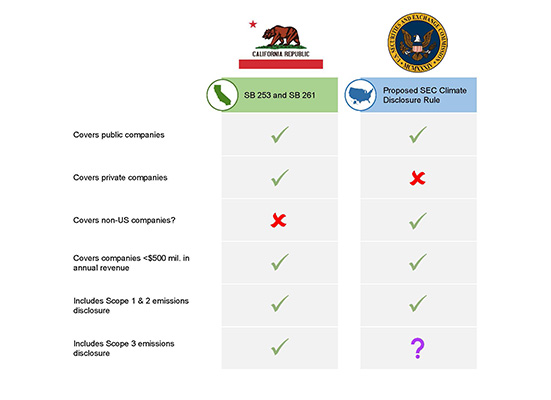California’s new climate disclosure laws create urgency for US manufacturing to raise the bar on tracking, reporting, reducing emissions.
By William Thiesen, CEO of EcoAct North America
California recently passed a pair of the most substantive climate action bills in US history. California’s Climate Corporate Data Accountability Act (SB 253) and the Climate-Related Financial Risk Act (SB 261) will call on all major manufacturing companies, beginning in 2026, to disclose their greenhouse gas emissions and to prepare climate-related financial risk reports disclosing “the entity’s climate-related financial risk and measures adopted to reduce and adapt to climate-related financial risk.”
For the high energy-intensive industrial sector that is directly responsible for 23% of California greenhouse gas (GHG) emissions, seamlessly integrating business and sustainability goals will not be easy. Forward-thinking manufacturers have been installing internal reporting/assessment infrastructures, rigorous governance structures, and monitoring mechanisms. The new climate disclosure laws emphatically raise the bar on tracking and reporting GHG, both beyond California’s current standards and beyond proposed SEC regulations. Industry leaders no doubt have questions on what, when, how, and to what extent they will modify business practices to comply.

The new laws go well beyond the current California Regulation for the Mandatory Reporting of Greenhouse Gas Emissions (MRR), applicable to electricity generators, industrial facilities, fuel suppliers, and electricity importers that operate in California and whose emissions exceed 25,000 metric tons of CO2 annually, amounting to about 450 entities. Beginning in 2026, all US-based organizations that do business in California with an annual gross revenue of over $1 billion will be required to disclose their 2025 Scope 1 and 2 emissions in accordance with the GHG protocol. As such, SB253 will impact 5,400 public and private companies, according to a California Senate report. This translates to most if not all major US manufacturers, since California accounts for 14% of the entire US economy.
Another signal that California is serious about setting the tone for aggressively achieving a net-zero economy by 2050 is its additional disclosure rules starting in 2027 for reporting Scope 3 value chain carbon emissions data. The long-awaited proposed SEC climate disclosure rule will likely not include private companies and may not include Scope 3 disclosure.
SB261 will require both public and private US-based organizations that do business in California with an annual gross revenue of over $500 million to prepare biennial climate-related financial risk reports beginning in 2026. About 10,000 companies will be subject to reporting rules, using an internationally recognized standard such as the Task Force on Climate-related Financial Disclosures (TCFD) or equivalent framework, which includes governance, strategy, risk management, and metrics and targets.
Since manufacturers will need to begin reporting on 2025 activity, corporations affected will need to have a concrete plan for gathering auditable emissions data well before the end of 2024. With such near-term compliance pressures, manufacturers must adopt an actionable approach and prioritize the development of comprehensive Scope 1-3 inventories. A successful approach should encompass the integration of climate-related risks into core businesses’ processes and governance, from product development and procurement policies to logistics and end-of-life management decision-making.
Our analysis found that merely 35% of large companies had validated science-based targets for Scope 1 and 2 emissions — and just 8% for Scope 3. Manufacturers must take their GHG emissions accounting and measurement to the next level if they are to both comply with new laws and also take substantive actions to achieve net-zero. Comprehensive Scope 3 reporting hinges on communicating with suppliers to facilitate seamless data exchange. The manufacturing industry and all related sectors must recognize interdependencies and interrelations. One company’s Scope 1 emissions are another company’s Scope 3 emissions.
The most effective first step in tackling rigorous new regulatory compliance is creating a credible climate transition plan, a time-bound, detailed roadmap that formalizes a higher level of preparedness by including operational KPIs that align with the new regulatory frameworks. An operationalization plan should be transparent and realistic both in terms of expected emissions reductions and the required investment; and includes a change management plan for engagement with stakeholders, including suppliers in the value chain. This comprehensive approach safeguards against significant environmental harm resulting from business activities and ensures that critical decarbonization efforts do not prohibitively harm business objectives.
California SB253 and SB261 are a call to action to usher in real climate accountability and action in the US. Whether we engage with it or not, the transition must and is happening. These frameworks for accounting for and reporting emissions and associated climate risks are catalyzing an urgent transformation of how we conduct business to ensure a livable and sustainable future for all.

As CEO for EcoAct, an Atos company, for North America with 14 years’ of experience in sustainability, William leads a team of experts supporting Global and Fortune 500 companies to develop and implement net-zero strategies. This includes managing projects for the private sector at any stage of their sustainability journey, including assessing emissions both direct and throughout the supply chain, setting and creating roadmaps for Science Based Targets (short term and net-zero), climate scenario analysis, and alignment with reporting frameworks and guidelines (CDP, TCFD, SASB). At EcoAct, we also develop carbon offsets projects (Nature and Technology Based Solutions) and support companies in procuring high quality carbon offsets to achieve their carbon neutral goals.
Currently based in NYC, William has an MBA from HEC – Paris has worked in sustainability and carbon offset project development while based in the USA, France, Mali, and Cambodia.
Scott Ellyson, CEO of East West Manufacturing, brings decades of global manufacturing and supply chain leadership to the conversation. In this episode, he shares practical insights on scaling operations, navigating complexity, and building resilient manufacturing networks in an increasingly connected world.